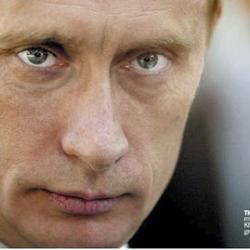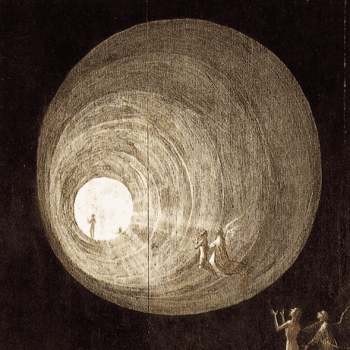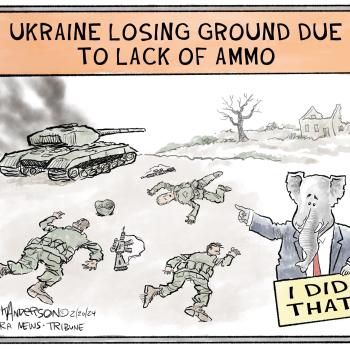I know. I tell everyone not to call people names.
But there comes a time when “idiot” isn’t a pejorative; it’s an excuse.
Mr Limbaugh is doing his the-pope-is-a-marxist-communist-not-a-corporatist-like-me thing again. After reading this latest rather bizarre attack against the Holy Father, I am faced with three possibilities.
1. Mr Limbaugh has relapsed into his drug problem.
2. He’s an idiot.
or
3. He is deliberately baiting the Vicar of Christ for ratings, despite the fact that a grade-school child could read the interview he’s referencing and know that he’s misquoting and miscasting what the Holy Father said.
Given the choices, I’ve decided that, in charity, I will give Mr Limbaugh the benefit of the doubt and assume that he’s an idiot. I don’t, for instance, think that the fact that he makes at least $70 million per year in salary, or that his net worth is approximately $400 million, has in any way messed with his mind.
What set Mr Limbaugh off on another of his attack-the-Holy-Father spiels is an interview Pope Francis gave to Il Messaggero on Sunday. Rather than try to untangle the web of misquotes and confabulation that Mr Limbaugh has spun, I’m going to quote a couple of highlights, then put Pope Francis’ entire interview below and let you read it for yourself.
Here are what I think of as the lowlights from Mr Limbaugh’s latest attack piece on my spiritual leader, Pope Francis.
“The 77-year-old pontiff gave an interview to Il Messaggero, Rome’s local newspaper, to mark the feast of Saints Peter and Paul, a Roman holiday. He was asked about a blog post in the Economist magazine that said he sounded like a Leninist when he criticized capitalism and called for radical economic reform.”
Oh, yeah, some obscure blog post in the Economist said he sounded like a Leninist, that got everybody riled up. We remember that. Don’t you? I don’t remember. Anyway, he said, “I can only say that the communists have stolen our flag. The flag of the poor is Christian. Poverty is at the center of the Gospel. Communists say that all this is communism. Sure, twenty centuries later. So when they speak, one can say to them: ‘but then you are Christian’,” he said, laughing.
I don’t know if the pope is saying that Jesus was a communist. I mean some people could read it that way. He says the communists stole our flag, and if our flag is rooted in solving poverty, and the communists want to claim that’s what they did, I mean, you connect the dots if you wish.
What Mr Limbaugh is doing here is quoting a misquote from an article headlined “Pope Says Communists are Closet Christians,” and then responding to it with the assessment, I don’t now if the pope is saying that Jesus was a Communist. I mean some people could read it that way.”
Ok, so he doesn’t know if Pope Francis is saying that Christ the Lord is a Communist? Are we supposed to believe that he’s serious?
Maybe he’s an idiot.
Or maybe this was an attempt to be sly and clever by attacking with innuendo.
You decide.
Me, I’m going with idiot, because, as I said, it’s the kindest interpretation I can come up with.
Here, for those of you who would like to see it, is what the Holy Father actually said. It’s the whole interview, without cuts or edits.
I highlighted the part about Communism so you can want go straight to it if you want. If you can find the place where the Pope Francis said or implied that Our Lord and Savior Jesus Christ is a Communist, let me know. Frankly, I think that all you have to do to understand what Pope Francis is talking about is to remember that he’s from a country where children live in garbage dumps and scavenge for survival; a country where Communists have tried to take over by appealing to these poorest of the poor and offering them help.
That, and read the interview yourself instead of miscasting misquotes in order to make a coarse point.
From Vatican Radio:
(Vatican Radio) The Rome daily “Il Messaggero” on Sunday published an interview with Pope Francis made by journalist Franca Giansoldati. In his responses to questions on a wide range of issues, the Holy Father focused, among other things, on the challenges of change in the current “era” and “culture,” which has consequences for political, financial, and social life. The Church, along with various civil and social institutions, must respond to these challenges by protecting the common good and defending human life and dignity.
“Always protecting the common good, which includes “defending human life and dignity” is “the vocation of every politician,” the Holy Father said. Today, the problem of politics – which Pope Francis called a “worldwide problem” – is that it “has been devalued, ruined by corruption, by the phenomenon of bribery.” This “moral decay, not only in politics but also in the financial or social” sector, is driven by “change of epoch” that we are experiencing today, which is also “a change of culture.” In this context, our anxieties about poverty are not concerned solely with material poverty.
“I can help someone who is hungry, so that they are no longer hungry,” the Pope said. “But if someone has lost his job,” he is involved in another kind poverty. He no longer has his dignity.” Helping families in need, then, requires a “joint effort.” Pope Francis recognized that this is an “uphill” journey, but insisted it must be undertaken, working above all for the good of children. “Starting a family is an effort,” he said, because of economic difficulties that “social policy does not help.” Commenting on the very low birth rates in Europe – which makes it seem “as if she were tired of being a mother, preferring to be grandmother,” the Holy Father noted that the causes of this phenomenon lie not only in a “cultural drift marked by selfishness and hedonism,” but also in the current economic crisis.
Pope Francis was asked how he would respond to being called “a communist.” “I would only say that the Communists have stolen the banner… The banner of the poor is Christian; poverty is at the heart of the Gospel.” The cause of the poor is pre-eminently a Christian cause. The Gospel cannot be understood “without understanding real poverty.” At the same time, the Pope said there is also a “very beautiful ‘poverty of the spirit’,” being poor in the sight of God because God fills you up. The Gospel, in fact, is addressed indiscriminately to the poor and to the rich and “does not at all condemn those who are rich,” but rather condemns their riches when they become the objects of idolatry.
To the question “Where is the Church of Bergoglio headed?” Pope Francis replied, “Thanks be to God, I don’t have any church – I follow Christ. I didn’t found anything.” He went on to say “my decisions are the fruit of the meetings before the conclave. I have done nothing on my own.”
The Church in Asia “is a promise,” he said, turning to his upcoming trips to Korea, in August, and to Sri Lanka and the Philippines, in January. He also spoke about China, saying it represents “a great, a very great pastoral challenge.”
During the interview, Pope Francis also took up a number of other themes already addressed during his pontificate, such as the place of women in the Church. Without an understanding of femininity, the Pope said, one “cannot understand the Church herself.” Women “are the most beautiful thing God has made. The Church is a woman.” He said that in doing theology, one must take account of this “femininity,” and that the Church must continue to work on and develop a “theology of the woman.”
Pope Francis spoke also about the corruption and the economic and sexual exploitation of children. The Pope speaks of incidents of child prostitution that were reported to him when he was archbishop of Buenos Aires, involving even elderly men. “For me,” the Pope said, “people who do this to young girls are paedophiles.”
Finally, on the feast of Saints Peter and Paul, the patron saints of Rome, Pope Francis spoke about the everyday life and traditions of the City of which the Pope is the bishop. This role, the Holy Father said, is “the first service of Francis.” Pope Francis said Rome shares many of the problems of other cities “such as Buenos Aires.” He said a conference dedicated to the theme of “the pastoral care of the great cities” will take place in Barcelona in November. Pope Francis expressed his hope that the citizens of Rome, the inhabitants of a city “that should be a beacon in the world,” would not lose “joy, hope, confidence, despite difficulties.”
















